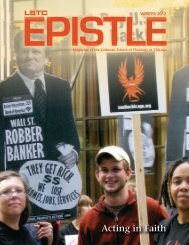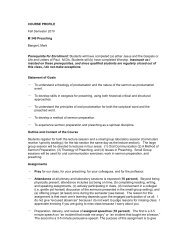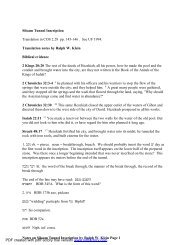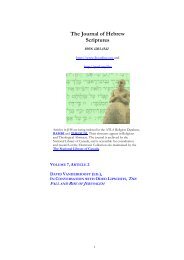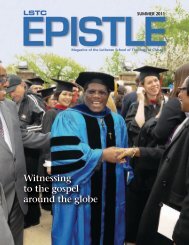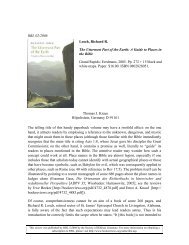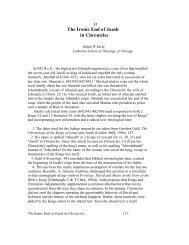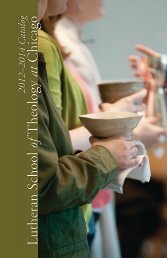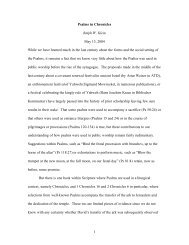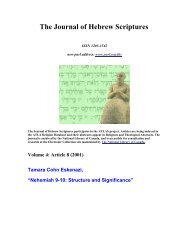Metacommentating Amos* Metacommentary, what is that ... - Fontes
Metacommentating Amos* Metacommentary, what is that ... - Fontes
Metacommentating Amos* Metacommentary, what is that ... - Fontes
You also want an ePaper? Increase the reach of your titles
YUMPU automatically turns print PDFs into web optimized ePapers that Google loves.
4. <strong>Metacommentating</strong> Amos 15who had appeared there for the sake of gain’, 19 we have nodoubt <strong>that</strong> the point of view being reported <strong>is</strong> <strong>that</strong> of Amaziahand not of the modern critic. But when we read, a few pages on,<strong>that</strong> Amos ‘w<strong>is</strong>hes to protest at being included in the same classas the professional prophets, whose preaching was not dictatedby Yahweh, but by the w<strong>is</strong>h to earn money’, 20 the relative clausebeginning ‘whose preaching’ can only be taken as the words ofthe scholar. 21 It <strong>is</strong> the scholar who advances the view <strong>that</strong> theprophets Amos d<strong>is</strong>sociates himself from are false prophets (‘notdictated by Yahweh’), and not even sincerely m<strong>is</strong>taken, but corrupt,and motivated only by the desire for money. Amos himself(the character Amos in the text, I mean) never says <strong>that</strong> otherprophets are false prophets, and never hints <strong>that</strong> the preachingof prophets and the sons of prophets <strong>is</strong> dictated by the w<strong>is</strong>h toearn money. He only says <strong>that</strong> he <strong>is</strong> not a ‘professional’prophet. 22 As far as we know, he may have nothing against pro-19 . Hammershaimb, Amos, p. 113.20 . Hammershaimb, Amos, p. 117.21 . It <strong>is</strong> the comma after ‘professional prophets’ <strong>that</strong> proves it: if therehad been no comma, the ‘whose preaching’ clause could be understood asdefining the professional prophets, and in <strong>that</strong> case could be representingthe perspective of Amos; but the comma turns the clause into a descriptiveclause, which can only represent the perspective of Hammerschaimb. Thed<strong>is</strong>tinction <strong>is</strong> the same as <strong>that</strong> between ‘<strong>that</strong>’, which introduces a definingclause, and ‘which’, which introduces a descriptive clause. If it <strong>is</strong> protested<strong>that</strong> the comma may have been introduced by the translator, I offer myapologies to Hammerschaimb, and fasten the blame on the translator. Andif <strong>is</strong> protested <strong>that</strong> I am making a lot of fuss about a comma, I will reply<strong>that</strong>, in th<strong>is</strong> case, on <strong>that</strong> comma hangs the difference between giving theimpression <strong>that</strong> one <strong>is</strong> uncritically adopting the opinions of Amos or beinga critical scholar. Real critical scholars will go to any lengths to prevent acomma cheating them of their reputation.22 . He may even be saying <strong>that</strong> he was not a professional prophet, but he<strong>is</strong> now. If Yahweh has taken him from following the flock, he <strong>is</strong> not being ashepherd any longer, <strong>is</strong> he? And if he <strong>is</strong> not earning a living from shepherding,<strong>is</strong> he perhaps earning it from prophesying?But where does the idea of ‘professional prophet’ come from, anyway?Does nabi mean <strong>that</strong>? Was Ezekiel, who was a professional priest, also aprofessional prophet? And in any case, <strong>is</strong> Amaziah implying <strong>that</strong> Amos <strong>is</strong>prophesying for the sake of income, and <strong>is</strong> he urging Amos to earn h<strong>is</strong> livingfrom prophesying elsewhere, or does ‘eat bread’ mean <strong>what</strong> it means



